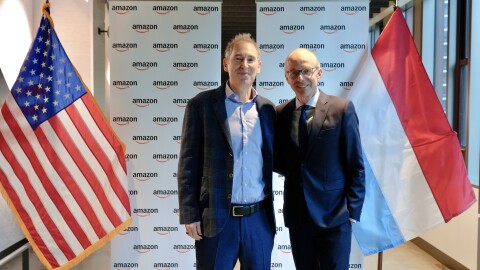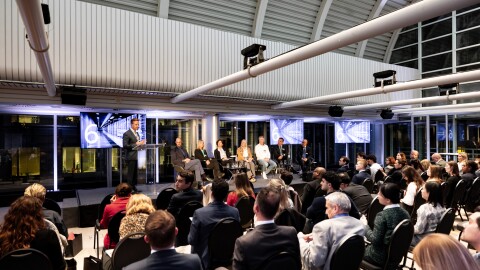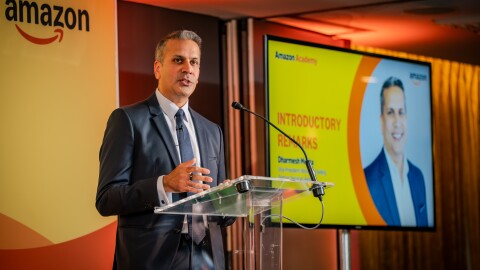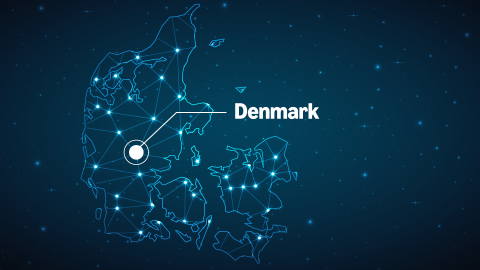Thank you to EU Commissioner Johannes Hahn and the Federation of Austrian Industries for giving me the opportunity to speak here today. I am Rocco Bräuniger and I am responsible for Amazon’s consumer business in Germany, Austria and Switzerland. I also lead on the expansion of our stores within Europe, such as our recent store launches in Poland, the Netherlands, and Sweden. This is my 18th year at Amazon - and it’s been a huge privilege to be part of Amazon’s European growth story and to serve our European customers.
I’m honoured to be in Salzburg with such a distinguished group to talk about the future of Europe – how we can make Europe sustainable, prosperous and strong – and how companies like Amazon are thinking about both the challenges and the opportunities, for all Europeans, including our customers and partners. I want to start with a brief overview of what Amazon is in Europe and what Europe means to Amazon. I will then provide our perspective on the policy choices that we believe can unlock future growth and prosperity for all of Europe, with a focus on harnessing the full potential of the EU’s Single Market.
Europe is part of our DNA
Some might think of Amazon as an American retailer, but the truth is that Europe is part of our DNA. It is a big part of who we are, where we’ve come from, and where we want to go. We have been here for a quarter of a century – all but three of our 28-year history – and we are now one of the continent’s largest job creators and investors.
Our 220,000 EU employees work in over half of all countries in Europe. Some may not realize that we employ just as many people here as iconic European brands like Nestle, Carrefour and Siemens in Europe. These jobs are realized through investment and partnership with local, national and European governments.
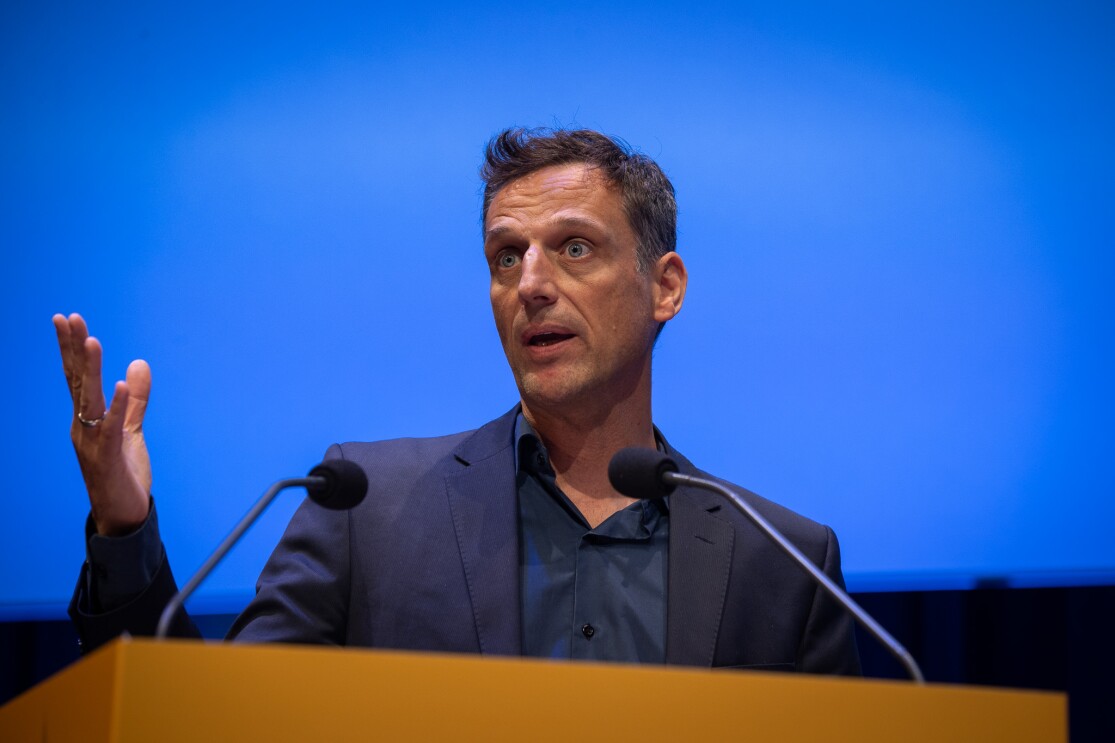
What does this partnership look like? Since 2010 we have spent more than €150 billion to grow Amazon across Europe - in everything from opening logistics sites, R&D centres and corporate offices, to launching new Amazon stores across the region - all in order to innovate and deliver for our customers here. This makes us one of Europe’s largest international investors.
Our employees speak more than 20 European languages and serve millions of consumers in the region each and every day – delivering low prices, great selection, and convenient delivery times. In fact, five of our ten most popular online stores are right here in Europe. Germany is our biggest store outside of the US, before the UK and Japan.
We are champions of European small business
What’s more, around 60% of everything bought on Amazon in Europe is sold by independent selling partners, the vast majority of these being small and medium-sized European businesses. That’s 275,000 European SMEs selling on our stores every day, with over 70% of these companies now selling across Europe’s borders and exporting internationally. We are proud to champion these businesses as they grow on Amazon, which have created a further 650,000 jobs in Europe. And, of course, this does not take into account our European supply chain and the specific services, tools and programmes we offer to help European business succeed in the commercial world. This includes cloud computing through AWS, professional procurement through Amazon Business, as well as free digital resources for start-ups and entrepreneurs through our Amazon Small Business Accelerator.
We are big supporters of European innovation
Much of Amazon’s invention - from the AI in Alexa to the robotics in our fulfilment centres - takes place in over 25 European development centres across seven European countries.
Right here in Austria - over in Graz - we have an R&D facility comprised of experts in the computer-vision field that help create “Sense and Avoid” technology for Prime Air drones. This is some of the most important foundational work for our drone programme, and is a big safety differentiator, on which we are proud to cooperate closely with the Graz University of Technology. The research there allows us to create a sophisticated and industry-leading sense-and-avoid system that will enable our drones to travel greater distances while safely and reliably avoiding other aircraft. Austrian ingenuity quite literally helps us go further and faster.
This example, and many others like it in our 25 European development centres, means that European talent, European science, and European academia are making consumers' lives easier every day. This is alongside billions of euros of investment already committed in sport, studio space and original local language television series across the continent. And support for thousands of European authors through Kindle Direct Publishing. This is further underpinned by our commitment to the European skills agenda - a commitment that has seen us become one of the largest investors in career development and social mobility on the continent.
We are committed to being a force for good in Europe
As is enshrined in our Leadership Principles, we know that our success and scale bring broad responsibility. And we are more committed than ever to play a leading role in tackling the challenges we all face as a society, from climate change to humanitarian crises.
We co-founded the Climate Pledge, our commitment to meet the Paris Agreement ten years early and reach net-zero carbon across our operations by 2040. More than 400 companies, representing 35 countries and 55 sectors, have already joined this commitment. We are already the largest corporate purchaser of renewable energy in Europe and have 80 on-site solar and 48 large-scale wind and solar projects across the continent – able to generate enough energy to power 3.5 million European homes a year. We’ve committed to investing €1 billion to electrify our European transportation network over the next five years.
We’ve also donated more than €350 million to European philanthropic initiatives since 2020. This is on top of our work supporting Ukraine, which has seen us set up humanitarian hubs in Poland and Slovakia to deliver vital goods to refugees and the displaced. In addition, within 48 hours of the crisis, Amazon Web Services helped secure vital government data to the cloud so that the Ukrainian government, education, and banking institutions could continue to serve Ukrainian people. For Amazon’s combined efforts in both humanitarian and digital aid, we were deeply honoured to have been awarded the Ukraine Peace Prize by President Zelenskyy.
We want to contribute to Europe’s future
I’ve talked about how invested and embedded we are in Europe. As everyone here knows, we’re heading into a European election year in 2024, the outcome of which will shape the future direction of policymaking for the years to come. So, I now want to touch upon where we see Europe heading and how we think we can contribute.
A barrier-free Single Market
This year the Single Market is 30 years old. The Single Market is described by the European Commission as one of the EU’s greatest achievements, leading to economic growth and making everyday life for European businesses and consumers easier. At Amazon, we share this sentiment. It is clear that the deeper the integration of the European Single Market, the more effective the results for Europe.
Amazon takes great pride in being a Single Market Champion. Our eight European stores provide products to millions of customers and in 2022 facilitated more than €17 billion in export sales by SMEs. This is possible because Amazon continuously develops innovative tools to help lower trade obstacles, for example VAT services for SMEs selling on Amazon. We also help customers make use of the Single Market by making available EU-wide product selection for customers all over Europe. Continuously voted one of Europe's most trusted consumer brands, we pride ourselves on being a champion of the EU's high customer protection standards, which we apply to all products sold on Amazon, no matter what their origin. This way, we not only act as an EU integrator, but also as a trustworthy hub for global imports. Beyond retail, our cloud solutions allow for seamless integration of EU-wide businesses, and Prime Video contributes to EU-wide publication of local video productions. But many obstacles to the Single Market remain.
The Single Market needs increased ambitions to lower the costs of growth for everyone, but especially for resource-limited businesses - we can do this through objective implementation and enforcement of Single Market rules.
I’ll give two concrete examples of frustrations we hear from our selling partners every day:
The first is trade barriers. There are many examples of this, from complex customs rules to payments legislation, but one stands out in particular. Today companies have to maintain foreign VAT registrations in every EU country where they are sending or holding stock. We know that merchants selling online want to hold their stock in multiple Member States in order to be as close as possible to consumers. We need to make it simpler for them to do business.
The solution? The European Commission has proposed legislation that would create a single EU VAT ID, allowing companies to register VAT only once and fulfil their tax obligations in all EU countries through a single online portal. This measure is crucial for SMEs as it removes administrative obstacles related to VAT payments and enables the expansion of their businesses throughout the EU. It needs to be prioritized.
Another is fragmented environmental legislation. The urgency of the green transition has caused Member States to move ahead at different speeds and in different directions.
One big example is recycling schemes which vary widely across the EU, both between Member States and between different product categories. This means that the efficiency and effectiveness of these schemes are undermined by their high level of complexity and non-harmonization, sometimes requiring separate registration of sales from producers in each Member State. These requirements entail high administrative and financial burdens for businesses, potentially blocking their ability to trade within the Single Market. This is especially the case for SMEs, which often sell volumes that are too small to justify the disproportionately high compliance costs. A truly harmonized approach could help strengthen the circular economy within the Single Market, while lowering unnecessary costs for businesses to act in an environmentally responsible manner.
A competitive Green Deal
When it comes to the green transition, we strongly support the objectives of the European Green Deal, including the European Commission’s plans to introduce a new greenhouse gas reduction target of 65-90% for 2040. To deliver on sustainability ambitions, whether Amazon’s Climate Pledge or the Green Deal, requires significant private investments. Business will be vital for delivering the EU’s 2030 and 2040 targets, and the 2050 climate neutrality target. In order to achieve this, businesses will need a strong, transparent and predictable regulatory framework.
And so, we look to the EU to continue to set ambitious targets and drive these through the revision or introduction of environmental policies and legislation. Critically, this framework needs to ensure an economically viable green transition - a Green Deal that is competitive, and which creates growth and jobs. Like the single market, sustainability legislation requires more simplification and more harmonization and a more ambitious and integrated approach when it comes to topics like sustainable transport.
An innovative economy fit for global leadership
Just like for the Green Deal, continuing to remove barriers inside Europe will make a significant difference for European businesses, in particular SMEs, and contribute to European strategic resilience.
At the same time, digital policies that make Europe more inward-looking will affect capacities to exploit the advantages of the Single Market. We are proud to feed and contribute to European innovation, but we are also conscious that Europe can only succeed in generating and maintaining truly innovative industries if it becomes a digital and innovation-friendly environment. Future policy must therefore incentivize further investments into Europe's technology and people.
So, I would now like to address the topic of regulation for innovation and the elements that are important for the EU’s continued digital transition.
Amazon shares the vision to build an EU fit for the digital age. And we agree with the European Commission President Von der Leyen that the digital transition is critical to unlocking further economic growth and job creation. Europe now has an opportunity to re-industrialize through future-oriented technology. To make Europe a digital and innovation-friendly environment requires a stable, supportive, and predictable regulatory environment, in particular for emerging technologies such as AI, drones and automation. Any new policies impacting the digital ecosystem should be evidence-based, customer-centric, technology-agnostic, and should safeguard EU and member state digitalization targets. The EU should integrate digital delivery as one aspect of all industries and remove policy silos. The retail industry is a great example where policy should encompass the reality of hybrid retail, rather than focusing on only online or offline channels. It is precisely the combination of digital technology and physical assets that has contributed to more innovation in Europe - Amazon is a clear example of this.
An open approach to EU resilience
We must keep in mind that innovation happens everywhere. So, Europe should not seek to isolate itself, but rather build resilient international alliances. In a context of geopolitical crisis, a strong EU-US relationship and cooperation to set global standards is crucial for mutual prosperity. Over the previous years, and especially since the COVID crisis and Russia’s war in Ukraine, the EU has advanced policies based on the idea of creating European “strategic autonomy”.
While the objectives may be desirable, strategic autonomy could divert much needed resources away when EU countries require investment to re-industrialize. A study by Frontier Economics found that strategic autonomy acts as a tax on the EU’s global trade, which in turn could reduce EU national income by between $12-22 billion on an annual basis. These are static effects. If we account for long-term effects on productivity, the impacts could be three to five times higher. Failing that, strategic autonomy would mark a substantial inward shift in the EU’s approach to trade, that could leave it worse off, and increase the fragmentation of global economic governance at a time when cooperation is at a premium.
In fact, key to the EU’s success has been open digital borders and a willingness to trade ideas with, and support, companies like Amazon, as well as to face outwards to the wider digital world. Technological innovation and progress don’t happen in isolation. Innovation in tech is a global pursuit; a team effort that relies on cross-border flows of information with rules and regulations that facilitate a positive exchange of ideas and support companies to innovate at a global level. There are significant mutual opportunities in transatlantic cooperation, and a strong EU is one that is open to the US, and vice versa. Across the Atlantic it will be crucial to find common ground on innovation-friendly policy issues - from data rules to cybersecurity, connectivity and AI.
Conclusion
To conclude, Amazon is deeply connected to Europe and we are fully invested in Europe’s future. We believe there is great potential for the EU to become even more sustainable, prosperous and strong and, as all of Europe looks to the future, there are three key areas we advocate for and to which we believe we can contribute.
- The Single Market at full potential: Once awe-inspiring in its ambitions to eliminate all internal barriers for goods, services, capital and people, the Single Market needs a boost to keep up with the needs of Europeans citizens, customers and businesses.
- A competitive Green Deal that ensures an economically viable transition that includes SMEs and allows for impact at scale.
- Ensuring Europe is an innovative economy fit for global leadership by setting the right conditions for investment and innovation and remaining open to doing business with other parts of the world.
We will continue to listen to what our partners and our customers need, and we will continue to work with the EU and national governments to advance these goals. I want to reiterate that we support and seek to act as a constructive, contributing partner in discussions on the future of Europe.
Thank you.











